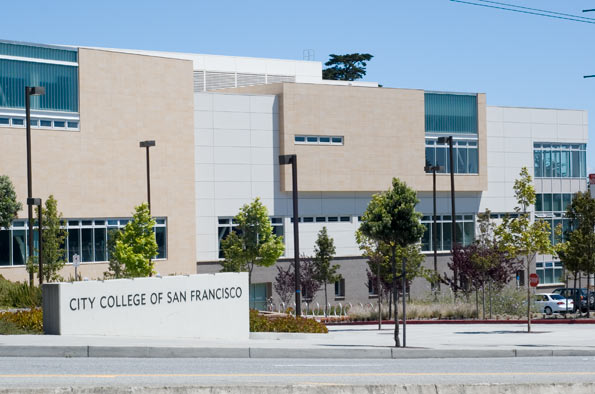Part-time teaching benefits City College and instructors

By Becca Hoekstra
The Guardsman
Hiring “Freeway Flyers,” part time, untenured teachers who teach at many campuses during a single semester, is becoming a widely used cost-saving measure at City College.
But the trend might not be as negative as portrayed in a recent San Francisco Chronicle article, City College English teacher Daniel Archer said.
“I think it gives [teachers] an opportunity to explore various departments, various student populations, to develop a better sense of where you want to work,” Archer said. “It gives the department an opportunity to get to know you before they commit to hiring you.”
“There are differences between schools, and it’s useful to see that,” said Ghislaine Maze, another English teacher.
The Collective Bargaining Agreement between the San Francisco Community College District and the American Federation of Teachers, the District is a front-runner among California community colleges in improving part-time faculty terms of employment relative to their full-time counterparts by “enhancing part-time faculty health benefits, improving pro rata pay (including ‘mirror’ pro rata scales), implementing paid office hours, and affording opportunities for upgrading to full-time status.”
At City College, full-time, starting pay teachers make an average of $55,600 annually, according to City College’s 2009-2010 Salary Tables. Part-time entry level pay-by-load faculty with a 67% work load earn an average of $51,180 per year. Entry level part-time teachers paid hourly get an average of $65 per hour, if they are teaching 40 credit units. When The Guardsman contacted Donald Lind of Payroll Services for more specifics on what determines payment amount, he could not be reached.
Archer had a more positive flyer experience than most. He taught at Contra Costa, SF state and City College for five years. After a large number of full-time positions became available in 2009, he was hired as a tenured teacher at City College.
Both Archer and Maze agree that part-timers working at other schools bring in fresh ideas and information on what’s happening at other campuses that can be valuable.There is no general rule of quality between part time teachers and full time. Those part time teachers, many of whom are young, can add much to the teaching style of a school. “It totally depends, but in some senses, I think there are some part time teachers who bring a lot of energy and innovative approaches,” Maze said.
“Once you’re firmly entrenched in the department and just adhering to the course outlines, it does become a little more standardized,” Archer said.
There are downsides to being a part-time teacher, however. For instance, some freeway flyers have extensive commutes to campuses all across the Bay Area. Part timers are not paid over breaks, meaning that it was necessary for Archer to apply for unemployment over summer and winter sessions. Part time teachers’ schedules don’t provide for enough time to attend department meetings. Though all faculty are invited to participate in meetings, when the department needs to vote on an issue, part-time teachers’ votes don’t count, Archer said. English Department Chair Jessica Brown could not be reached for confirmation.
Part-time employees are not eligible for medical or dental benefits until their third semester teaching, and then only if they work a certain number of hours. They don’t have eligibility for family medical leave, according to the Collective Bargaining Agreement between the SFCCD and APT.
“What was stressful was the constant uncertainty about having work. When you’re a a part-timer, schools are under no contractual obligation to give you work,” Archer said. “There was this constant dark cloud looming that at any point I could be told ‘Sorry, we have nothing for you.’”
But since he was able to “check all insecurities at the door”, stress didn’t have negative effects on his teaching and relationships with students, he said.He did struggle with teaching invading his personal life. When freeway flying, he gave out his personal email to students so they could contact him at any time. Now that he’s a full time teacher, he’s much more physically available for his students, Archer said.
“[Freeway flying] is not tenable in the long-term. When you’re a fresh teacher and you’re eager, you know that you’re going to have to work hard to learn what you’re doing. People plunge into it, and they do it, but then 3 years, 4 years, 5 years down the pipe, that’s when probably people start to feel burnt out,” Maze said.
“I kind of feel like teachers just accept [freeway flying] as part of the job,” Archer said.
Both English teachers are pleased that they are done freeway flying and can settle down in their full-time jobs .
“I’m a better teacher now that I’m full time, because I’m doing it more and I’m thinking about it more,” Maze said.
“If anything I feel more invested in this department. I would like to become more involved in committees and things like that,” Archer said. “It’s nice to have it settled and know that I’m here for the long run. It’s easier for me to make contributions to the campus and to the department.”
City College keeps things even between the part time and full time employees. 49 full-time tenure track positions were filled in the Fall ‘09 – Spring ’10 period, with 41 new part time faculty hired, according to the Employee & Hiring Data Report.
Email:
bhoekstra@theguardsman.com

Comments are closed.